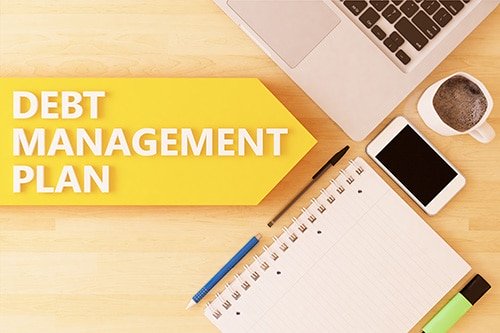As people struggle with mounting debt, debt management plans (DMPs) are becoming more common. A debt management plan is an arrangement reached between a debtor and their creditors to repay their debt over time, typically at a lower interest rate. However, many consumers are concerned about how DMPs would damage their credit ratings. In this article, we will define a DMP, explain how it works, and how it can impact your credit score.
Table of Contents
- Introduction
- What is a Debt Management Plan?
- How does a Debt Management Plan work?
- Can a Debt Management Plan affect your credit score?
- How long does a Debt Management Plan stay on your credit report?
- What are the benefits of a Debt Management Plan?
- What are the disadvantages of a Debt Management Plan?
- How to Qualify for a Debt Management Plan?
- How to Set up a Debt Management Plan?
- How to maintain a Debt Management Plan?
- How to monitor your credit score during a Debt Management Plan?
- What are the alternatives to a Debt Management Plan?
- Conclusion

What is a Debt Management Plan?
A Debt Management Plan (DMP) is a debt management tool that assists people in repaying their unsecured debt. Unsecured debts, such as credit card debts, medical expenses, and personal loans, are not secured by an asset. A DMP is typically provided by a credit counseling agency or a debt reduction firm. The organization bargains with creditors to cut interest rates waive late fees, and lower monthly payments to an acceptable level.
How does a Debt Management Plan work?
You must contact a credit counseling organization or a debt reduction company to set up a DMP. They will look over your finances, including your income, expenses, and obligations. Based on this information, they will develop a budget and payback plan tailored to your specific requirements. They will also work with your creditors to reduce interest rates and waive late fees.
You will make a monthly payment to the credit counseling agency or debt reduction organization once you have agreed to the terms of the DMP. The payment will subsequently be distributed to your creditors in accordance with the repayment arrangement. You will make payments until you have paid off all of your debts.
Can a Debt Management Plan affect your credit score?
Yes, a DMP can have an impact on your credit score. Your creditors will record your enrollment in a DMP to the credit agencies. Your credit report will list this as a “Debt Management Plan” or a “Credit Counselling Plan.” This can harm your credit score since it suggests that you are having difficulty paying your debts.
However, the impact on your credit score is not as severe as if you declared bankruptcy or defaulted on your bills. In reality, if you make your payments on time and in full, a DMP can help you improve your credit score in the long run. This demonstrates that you are responsible and capable of managing your bills.
How long does a Debt Management Plan stay on your credit report?
A DMP can be recorded on your credit report for up to seven years. This may impair your capacity to obtain credit in the future since lenders will see that you have previously struggled to pay your bills. However, as long as you continue to make your payments on time and in full, the influence on your credit score will reduce with time.
What are the benefits of a Debt Management Plan?
The benefits of a DMP include:
- Lower interest rates
- Waived late fees
- Reduced monthly payments
- A structured repayment plan
- One monthly payment to manage your debts
What are the disadvantages of a Debt Management Plan?
The disadvantages of a DMP include:
- It may take longer to pay off your debts
- It may be harder to get new credit while on a DMP
- Your credit score may be negatively affected
- You may have to close your credit card accounts
How to Qualify for a Debt Management Plan?
To be eligible for a DMP, you must have unsecured debts that you are unable to pay. You must also have a consistent source of income that can support your living expenses as well as the monthly DMP payment. If you are having difficulty paying your obligations, it is recommended that you speak with a credit counseling service or a debt relief organization to see whether a DMP is suited for you.
How to Set up a Debt Management Plan?
You will need to call a credit counseling organization or a debt reduction company to set up a DMP. They will look over your finances, including your income, expenses, and obligations. Based on this information, they will develop a budget and payback plan tailored to your specific requirements. They will also work with your creditors to reduce interest rates and waive late fees.
You will make a monthly payment to the credit counseling agency or debt reduction organization once you have agreed to the terms of the DMP. The payment will subsequently be distributed to your creditors in accordance with the repayment arrangement. You will make payments until you have paid off all of your debts.
How to maintain a Debt Management Plan?
To keep your DMP active, you must make your monthly payments on schedule and in full. You must also refrain from incurring new loans while on the plan. If your financial situation changes, such as a loss in income or an increase in expenses, you should call your credit counseling agency or debt relief organization right once.
How to monitor your credit score during a Debt Management Plan?
You can keep track of your credit score during a DMP by monitoring your credit report on a regular basis. AnnualCreditReport.com allows you to obtain a free copy of your credit report from each of the three main credit bureaus once a year. You can also join a credit monitoring service, which will warn you if your credit report changes.
What are the alternatives to a Debt Management Plan?
The alternatives to a DMP include:
- Debt settlement
- Bankruptcy
- Debt consolidation loan
- Paying off debts on your own
It is critical to consult with a credit counseling organization or a debt reduction firm to determine which choice is best for your financial position.
Conclusion
A Debt Management Plan might help you manage your debts and pay them off gradually. It can, however, have a negative impact on your credit score. Before enrolling in a DMP, examine the advantages and downsides and consult with a credit counseling agency or debt reduction organization to see if it is good for you.



